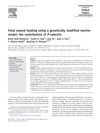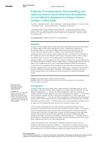 18 citations,
January 2017 in “Annals of dermatology/Annals of Dermatology”
18 citations,
January 2017 in “Annals of dermatology/Annals of Dermatology” Certain immune cells contribute to severe hair loss in chronic alopecia areata, with Th17 cells possibly having a bigger impact than cytotoxic T cells.
 17 citations,
December 2019 in “Stem Cells International”
17 citations,
December 2019 in “Stem Cells International” Bioactive molecules show promise for improving skin repair and regeneration by overcoming current challenges with further research.
 15 citations,
March 2021 in “Journal of clinical medicine”
15 citations,
March 2021 in “Journal of clinical medicine” Biologic treatments for Crohn's disease and ulcerative colitis can cause skin problems, and doctors should adjust treatment if these occur.
 15 citations,
February 2019 in “Journal of clinical medicine”
15 citations,
February 2019 in “Journal of clinical medicine” Atorvastatin reversed memory problems caused by cancer drug trastuzumab and improved its cancer-fighting abilities without causing hair loss.
 15 citations,
January 2010 in “Experimental Dermatology”
15 citations,
January 2010 in “Experimental Dermatology” Hair loss in certain young mice is linked to a specific gene and can be caused by lack of iron.
 15 citations,
April 2003 in “Journal of dermatology”
15 citations,
April 2003 in “Journal of dermatology” Alopecia areata causes hair loss due to an immune attack on hair follicles, influenced by genetics and environment.
 14 citations,
March 2022 in “Journal of inflammation research”
14 citations,
March 2022 in “Journal of inflammation research” Baricitinib shows promise as a new treatment for certain skin conditions like alopecia areata.
 14 citations,
October 2012 in “Clinics in Plastic Surgery”
14 citations,
October 2012 in “Clinics in Plastic Surgery” Adding stem cells to fat grafts for facial rejuvenation might improve outcomes, but more research is needed to confirm safety and effectiveness.
 13 citations,
February 2018 in “Plastic and Reconstructive Surgery”
13 citations,
February 2018 in “Plastic and Reconstructive Surgery” The study found that a specific signaling pathway helps skin wounds heal faster but may lead to larger scars.
 13 citations,
January 2016 in “Journal of cosmetology & trichology”
13 citations,
January 2016 in “Journal of cosmetology & trichology” Alternative treatments show promise for hair growth beyond traditional methods.
 12 citations,
May 2018 in “JAAD Case Reports”
12 citations,
May 2018 in “JAAD Case Reports” A man's gray hair got darker and thicker after using a psoriasis drug.
 11 citations,
June 2022 in “Frontiers in immunology”
11 citations,
June 2022 in “Frontiers in immunology” New protein changes may be involved in the immune attack on hair follicles in alopecia areata.
 10 citations,
January 2016 in “Elsevier eBooks”
10 citations,
January 2016 in “Elsevier eBooks” Nanoparticles can speed up wound healing and deliver drugs effectively but may have potential toxicity risks.
 10 citations,
July 2015 in “Current opinion in pediatrics, with evaluated MEDLINE/Current opinion in pediatrics”
10 citations,
July 2015 in “Current opinion in pediatrics, with evaluated MEDLINE/Current opinion in pediatrics” New genes linked to ichthyosis were found, but there's still no cure; treatment options are improving.
 10 citations,
April 2008 in “Journal of Pediatric Surgery”
10 citations,
April 2008 in “Journal of Pediatric Surgery” P-selectin is not the only factor that prevents scarring in fetal wound healing in mice.
 7 citations,
April 2021 in “Dermatology and Therapy”
7 citations,
April 2021 in “Dermatology and Therapy” H-1 antihistamines may help with various skin conditions, but more research is needed to confirm their effectiveness.
 7 citations,
April 2020 in “Curēus”
7 citations,
April 2020 in “Curēus” Combining hair transplantation with microneedling or laser and UV light may help treat tough vitiligo on hands and feet, with microneedling being affordable and easy to learn.
 7 citations,
January 2017 in “Journal of cosmetology & trichology”
7 citations,
January 2017 in “Journal of cosmetology & trichology” Good nutrition is crucial for healthy hair and can help with hair loss without medication.
 4 citations,
August 2020 in “Applied Materials Today”
4 citations,
August 2020 in “Applied Materials Today” Hydrogel microcapsules help create cells that boost hair growth.
 4 citations,
November 2017 in “Scientific Reports”
4 citations,
November 2017 in “Scientific Reports” The research provides a gene-based framework for hair biology, highlighting the Hippo pathway's importance and suggesting links between hair disorders, cancer pathways, and the immune system.
 3 citations,
June 2017 in “Methods”
3 citations,
June 2017 in “Methods” Researchers created a model to understand heart aging, highlighting the role of microRNAs and identifying key genes and pathways involved.
 2 citations,
January 2019
2 citations,
January 2019 The document concludes that autoimmune skin disorders are treated with corticosteroids and immunosuppressive drugs.
 2 citations,
January 2012 in “InTech eBooks”
2 citations,
January 2012 in “InTech eBooks” Chemotherapy often causes hair loss, which usually grows back within 3 to 6 months, but there's no effective treatment to prevent it.
 1 citations,
March 2021 in “Phytomedicine plus”
1 citations,
March 2021 in “Phytomedicine plus” Cernitin™, a pollen extract, was found to significantly reduce pain and inflammation in rats with chronic prostatitis, suggesting it could be a useful alternative to certain anti-inflammatory drugs.
 1 citations,
December 2016
1 citations,
December 2016 Researchers created a model to understand heart aging, highlighting key genes and pathways, and suggesting miR-208a as a potential heart attack biomarker.

Stem cell therapy shows promise for treating hair loss in androgenetic alopecia.
 April 2024 in “International journal of women's health”
April 2024 in “International journal of women's health” Adult female acne is a complex condition that can worsen with menopause, requiring holistic treatment and tailored skincare at different life stages.
 January 2024 in “International Journal of Dermatology Venereology and Leprosy Sciences”
January 2024 in “International Journal of Dermatology Venereology and Leprosy Sciences” Patients with acne vulgaris have lower serum irisin levels.
 December 2023 in “International journal of multidisciplinary research and analysis”
December 2023 in “International journal of multidisciplinary research and analysis” SH-MSCs gel reduced IL-6 and increased TGF-β, suggesting it could treat alopecia.
 November 2023 in “Klìtinna ta organna transplantologìâ”
November 2023 in “Klìtinna ta organna transplantologìâ” MSC-derived exosomes can help treat COVID-19, hair loss, skin aging, and arthritis.





























